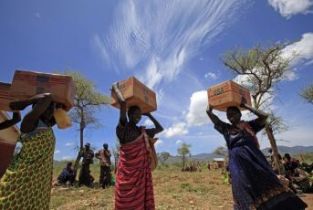UN urges to ensure safe environment for aid workers in South Sudan
November 5, 2010 (JUBA) – Southern Sudanese authorities are urged to secure safe security environment for aid workers who struggle to reach needy who face food shortage in the semi-autonomous region, a UN official said today.

Valery Amos of the United Kingdom, who is appointed last July as United Nations Under-Secretary-General for Humanitarian Affairs and Emergency Relief Coordinator (ERC), started today a six-day visit to Sudan where she met in Juba with the First Vice President Salva Kiir Mayadrit who is also the head of Southern Sudan government.
Amos, “asked for a renewed commitment from authorities in the South to ensure that the delivery of humanitarian assistance is unhampered and free from any political, ethnic or religious consideration,” said a statement released by the Office of the Coordination of Humanitarian Affairs (OCHA) on Friday.
Aid groups highlighted recently difficult security conditions in southern Sudan. They cite 118 incidents of interference in this year.
“Harassment of and violence against humanitarian workers is unacceptable and I am concerned for their security,” Amos said.
The UN’s top humanitarian official stressed that Southern Sudan is at critical juncture as it will vote within two months to decide its future. The semi autonomous region witnessed this year less violence than 2009.
However, with food shortages this year, seasonal flooding and attack by the rebel Lord Resistance Army as well as the expected return of displaced southerners from northern Sudan, the humanitarian community should be prepared, she underscored.
Amos further urged the southern Sudan authorities to conduct a voluntary and well organized return of the IDPs
“Ensuring that returns take place in a free and principled manner is the responsibility of the Government,” Amos said. “However, humanitarian workers are ready to assist where there is clear humanitarian need, and where the government is not able to provide the required support,” she added.
“Time is limited, and the challenges are enormous. No one wants to see a new humanitarian crisis, as a result of unresolved issues,” Amos stressed.
UN officials this summer estimated that over three million people — 40% of southern Sudan population — are facing real humanitarian risk. Lise Grande, the Deputy Resident Humanitarian Coordinator in Southern Sudan said this humanitarian crisis puts southern Sudan in a situation, to some extent, similar to Darfur.
Grande also said this year more than than 2,000 people have died in inter-tribal violence and more than 250,000 people have been displaced across the ten states of Southern Sudan.
(ST)
